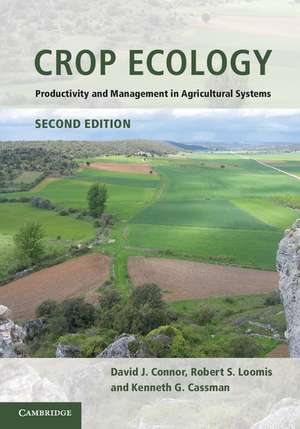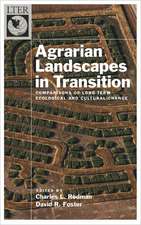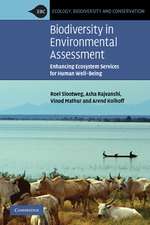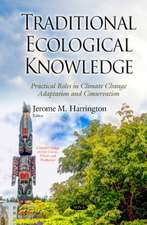Crop Ecology: Productivity and Management in Agricultural Systems
Autor David J. Connor, Robert S. Loomis, Kenneth G. Cassmanen Limba Engleză Paperback – 27 apr 2011
| Toate formatele și edițiile | Preț | Express |
|---|---|---|
| Paperback (1) | 408.69 lei 3-5 săpt. | +36.57 lei 10-14 zile |
| Cambridge University Press – 27 apr 2011 | 408.69 lei 3-5 săpt. | +36.57 lei 10-14 zile |
| Hardback (1) | 1102.67 lei 6-8 săpt. | |
| Cambridge University Press – 27 apr 2011 | 1102.67 lei 6-8 săpt. |
Preț: 408.69 lei
Preț vechi: 444.23 lei
-8% Nou
Puncte Express: 613
Preț estimativ în valută:
78.20€ • 81.87$ • 64.71£
78.20€ • 81.87$ • 64.71£
Carte disponibilă
Livrare economică 15-29 martie
Livrare express 04-08 martie pentru 46.56 lei
Preluare comenzi: 021 569.72.76
Specificații
ISBN-13: 9780521744034
ISBN-10: 0521744032
Pagini: 576
Ilustrații: 169 b/w illus. 66 tables
Dimensiuni: 173 x 244 x 25 mm
Greutate: 0.9 kg
Ediția:2 Rev ed.
Editura: Cambridge University Press
Colecția Cambridge University Press
Locul publicării:Cambridge, United Kingdom
ISBN-10: 0521744032
Pagini: 576
Ilustrații: 169 b/w illus. 66 tables
Dimensiuni: 173 x 244 x 25 mm
Greutate: 0.9 kg
Ediția:2 Rev ed.
Editura: Cambridge University Press
Colecția Cambridge University Press
Locul publicării:Cambridge, United Kingdom
Cuprins
Preface; Part I. Farming Systems and Their Biological Components: 1. Agricultural systems; 2. Trophic chains; 3. Community concepts; 4. Genetic resources; 5. Development; Part II. Physical and Chemical Environments: 6. Aerial environment; 7. Soil resources; Part III. Production Processes: 8. Nitrogen processes; 9. Water relations; 10. Photosynthesis; 11. Respiration and partitioning; Part IV. Resource Management: 12. Soil management; 13. Strategies and tactics for rainfed agriculture; 14. Water management in irrigated agriculture; 15. Energy and labor; Part V. Farming, Then, Now and in the Future: 16. Evolution of wheat farming systems in southern Australia; 17. Technological change in high-yield agriculture; 18. The future of agriculture; Species list; Conversions and constants useful in crop ecology; Index.
Recenzii
'The new edition of Crop Ecology, by Connor, Loomis, and Cassman, retains the strengths of the earlier edition, namely, insightful analysis of the key principles that explain crop resource use and growth, based on extensive use of peer-reviewed data, averaging more than one graph or table per page. Any practitioner or student of 'evidence-based agriculture' needs a copy of this book.' R. Ford Denison, University of Minnesota, and author of Darwinian Agriculture
'… a timely update of a foundational text for college or graduate curricula providing comprehensive treatment of ecological principles and concepts central to achieving global food security and to conducting the environmental accounting critical to sustaining productivity through judicious natural resource management … an essential desk reference for practising systems agronomists, agro-ecologists, and agricultural economists and biological engineers pursuing biophysical life cycle analyses. With a predominant focus on staple crop systems, [the] authors … present key biophysical mechanisms and processes with detailed explanations of the quantitative approaches to their estimation; in-depth examples and case studies facilitate comprehension. Important new sections include ideotype concepts in respiration and partitioning, spatial variability in soil management, energy and labor requirements for bioenergy crops, and irrigation and world food supply. This book is remarkably easy to read and will be accessible to a range of knowledge levels and backgrounds.' Sylvie M. Brouder, Purdue University
'… a good introductory text for students of agriculture and environmental science.' The Biologist
'The second edition provides a worthy successor to the first. … It is easy to read despite containing a wealth of detail. It is definitely a book to recommend to serious students of crop science and of managed ecosystems.' Journal of Agricultural Science
'This edition retains the engaging conversational tone that made the original volume popular with students. The presentation of crop ecology in this text employs unparalleled clarity to facilitate interest and learning. Despite its focus as an educational work, this book would have considerable utility as a reference for practitioners in the field. As with the original text, the second edition saves the best for last - Chapter 18 conveys the authors' collective vision for the future of agriculture. If this edition weathers the test of time as well as [the] original, then this chapter alone is required reading for agriculturalists.' Thomas G. Chastain, The Quarterly Review of Biology
'… a timely update of a foundational text for college or graduate curricula providing comprehensive treatment of ecological principles and concepts central to achieving global food security and to conducting the environmental accounting critical to sustaining productivity through judicious natural resource management … an essential desk reference for practising systems agronomists, agro-ecologists, and agricultural economists and biological engineers pursuing biophysical life cycle analyses. With a predominant focus on staple crop systems, [the] authors … present key biophysical mechanisms and processes with detailed explanations of the quantitative approaches to their estimation; in-depth examples and case studies facilitate comprehension. Important new sections include ideotype concepts in respiration and partitioning, spatial variability in soil management, energy and labor requirements for bioenergy crops, and irrigation and world food supply. This book is remarkably easy to read and will be accessible to a range of knowledge levels and backgrounds.' Sylvie M. Brouder, Purdue University
'… a good introductory text for students of agriculture and environmental science.' The Biologist
'The second edition provides a worthy successor to the first. … It is easy to read despite containing a wealth of detail. It is definitely a book to recommend to serious students of crop science and of managed ecosystems.' Journal of Agricultural Science
'This edition retains the engaging conversational tone that made the original volume popular with students. The presentation of crop ecology in this text employs unparalleled clarity to facilitate interest and learning. Despite its focus as an educational work, this book would have considerable utility as a reference for practitioners in the field. As with the original text, the second edition saves the best for last - Chapter 18 conveys the authors' collective vision for the future of agriculture. If this edition weathers the test of time as well as [the] original, then this chapter alone is required reading for agriculturalists.' Thomas G. Chastain, The Quarterly Review of Biology
Notă biografică
Descriere
A detailed exploration of the impact of environmental conditions and management on crops, resource requirements and soil resources.















